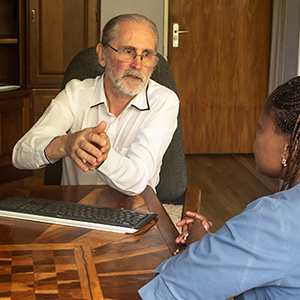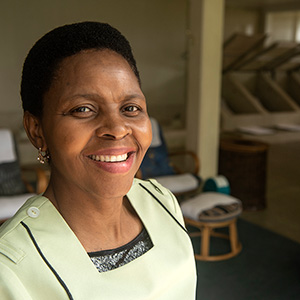




Understanding Diabetes
The programme we offer is for Type 2 Diabetes only. Type 1 Diabetes is something completely different and it creates a lot of confusion to have given them the same name. The only similarity is that they both affect blood sugar levels. Type 1 Diabetics can benefit in many ways from a programme at Hoogland, but the packages described below are focussed on sending Type 2 Diabetics into remission. If you are a Type 1 Diabetic please contact us by mail or phone to discuss different package options.
What is Diabetes?
To understand these diseases better, it is worth understanding the role of insulin. Insulin is made by the beta cells in the pancreas. It is a hormone that regulates metabolic processes, of which regulating blood sugar levels is the most well known. Insulin allows the muscle, liver and fat cells to absorbe glucose from the blood. The glucose serves as energy to the cells or it can be converted to fat to be used later. So insulin provides energy to cells, but also reduces high sugar levels in the blood by telling the cells to absorb blood sugar.
Glucagon is the hormone made by the alpha cells in the pancreas that does the opposite – when our blood sugar levels are too low, it will tell the body to release blood sugar from where it is stored so it can be used by cells that need it for energy. Other hormones that also release blood sugar include adrenaline, noradrenaline, cortisol (all stress-hormones) and growth hormone.
Type 1 Diabetes
Type 1 Diabetes is an auto-immune disease which makes your body’s own imune system destroy the body’s own beta-cells in the pancreas, so it cannot make insulin. This means that it cannot send blood sugar into the cells, which leaves the energy the cells need in the blood. Untreated, Type 1 Diabetes can cause many complications, and the most feared is the rapid onset diabetic ketoacidosis which causes doabetic coma. Type 1 Diabetes cannot be cured and diabetics with this kind of diabetes have a better quality of live and an increased life expectancy through the breakthroughs pharmaceuticals have made. From first finding a way of making injectable insulin to specialised implants that monitor blood sugar levels and release metered insulin in response.
Type 2 Diabetes
Type 2 Diabetes is a whole other matter. It is when we have very large spikes in blood sugar and where the body’s cells are so full of sugar already, that they don’t want any more and stop listening or responding to the instructions insulin provides. The pancreas desperately tries to get the cells to take up more blood sugar, and produces ever larger volumes of insulin, until at last it burns out and can’t produce sufficient insulin any longer. Type 2 Diabetes takes a long time to develop, and we have several tests available that can test of this kind of diabetes and treat it before lasting damage is caused.
At the moment the only medication available for Type 2 Diabetes is medication that forces the cells to take up excessive blood sugar: cells that are already so full they have stopped listening to the body’s own instructions. These treatments do not treat the cause, and in the temporary fix of measurable markers, actually cause more harm in in the long run.
Untreated this disease causes massive heart and blood vesel damage, nerve damage, kidney damage, eye damage, hearing impairment and dementia.
Diabetes II cannot be cured. It can, however, be sent into remission, permanently, at most stages after diagnosis. The reason it’s not curable in the traditional sense of the word, is because it is a Lifestyle Disease. The only long term effective treatment of Type 2 Diabetes is (are) changes in lifestyle. Sometimes these changes are surprisingly small and easy to maintain, but should ex-diabetics revert to their old ways, diabetes will soon return.
Changes in lifestyle will include everthing that reduces large insulin spikes (diet and stress management) as well as the use of the stored energy (physical activity)
Treatment:
There are some well known ways to treat diabetes from the comfort of your own home. We find that the transition between a diabetes causing to a diabetes preventing lifestyle can be physically, emotionally and mentally taxing, and there are several medically significant risks associated with this transition. For these reasons, a professional establishment like Hoogland is a valuable and effective alternative.
The best thing you can do for your own health is to continue to educate yourself, and always, always be careful what sources you use for your information. Read widely and don’t follow the latest fad or believe in ‘miracle cures’.
Our programmes help clients to recovery (recover) from a wide variety of lifestyle diseases, and improve overall health and wellbeing on many levels. In terms of how we can help prevent or treat Diabetes, here are a few highlights:
Exercise
We all know that physical activity or exercise is key to improving insulin sensitivity. High Intensity Interval Training or HIIT for short, shows the biggest immediate gain, but a combination of activities, including stretching, weight bearing and cardio work best.
For people who have been inactive for a while, or who have more complex health concerns, finding the appropriate exercise programme without professional expertise can pose many risks. Launching your new self into a healthy active lifestyle is best done under the guidance of a biokineticist.
Remember, not all physical activity is related to a gym. There are a myriad of active hobbies, office and home routines and some general, practical tips for being active enough for health.
Our biokineticists can help you become fitter and maintain healthy activity levels that will also fit into your lifestyle and complement your personality.
Fasting
Water-fasting for extended periods of time is one of the quickest ways to heal the pancreas, increase insulin sensitivity in cells and improve blood glucose control.
The risks associated with extended fasting is (are) potentially higher in people with type II diabetes. Our medical staff with the aid of an on-site laboratory help ensure that closely monitored fasting remains beneficial.
Intermittent fasting is also an excellent alternative, and our medical staff combine their expertise with our nutritionists to tailor make an intermittent fasting programme with the correct foods in-between.
A tailor made programme and guidance on intermittent fasting at home is also provided.
Diet
Adjusting of a diabetic diet is often the first defence against diabetes. This change in diet is sometimes very challenging to maintain long term.
The focus should be on unprocessed and un-refined, and be careful of hidden sugars. If at all possible, grow some of your own food, even if its not much. The fresher the better.
Individuals have different cultural, social and emotional connotations with food and live in widely diverse circumstances. There is so much to consider and our nutritionist work (works) with guests to ensure that their diets are practical, achievable and still embrace the joy of food.
Heat treatment
As a chronic disease, diabetes is associated with increased inflammation as well as vascular degeneration. Heat treatment, such as a long, hot bath, will help reduce inflammation, improve vascular plasticity and glucose balance. Recent studies have also found that heat treatment will reduce visceral fat percentages and insulin resistance.
At Hoogland our heat treatments go well beyond a hot bath. We also have steam rooms, steam cabinets, saunas, heated pools and Jacuzzis, and all of these are supervised by experienced staff.
Sleep
Sufficient sleep and practicing good sleep hygiene is another important factor. When you are sleep deprived, your body makes large amount of ghrelin. Ghrelin is a hormone that makes you hungry, and the amount secreted makes you crave high energy foods. These cravings can become extreme and in a world where high energy, low nutrient food is readily available, lack of sleep often contributes to poor dietary choices.
Understanding your own sleeping patterns and the importance of sleep, practicing good sleep hygiene and avoiding alcohol or other sedatives near bedtime are all ways to help you sleep better.
It might also be worth visiting a sleep lab and ensuring that you do not suffer from sleep apnoea, something often associated with Type II diabetes.
Resident Diabetes Packages
Over the last few years, Hoogland has seen dramatic improvement in the health of diabetics who have completed one of our health programmes. Our dedicated diabetes and pre-diabetes programme has helped many people into remission.
For more information on our packages have a look at:
